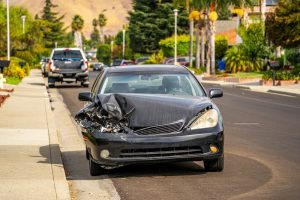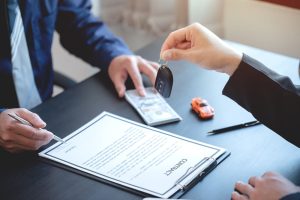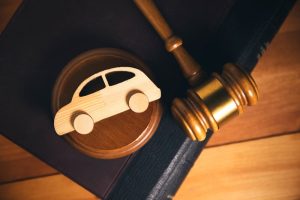Car accidents are always stressful and overwhelming situations, and it can be even more complicated if you have a leased vehicle. When your leased car gets damaged in an accident, it raises questions about what happens next and who is responsible for the repairs. Unfortunately, in most cases, you are still responsible for the damages to the leased vehicle.
Typically, your auto insurance policy should cover the repairs, and you will need to file a claim. It’s essential to review the terms of your lease agreement as it may impose additional requirements or fees in case of an accident. Contact a knowledgeable car accident attorney to ensure you understand your rights and obligations. They can review your insurance policy and your lease agreement and help take the next steps to resolve this unexpected matter.
Understanding Leased Cars and Their Unique Challenges
Leasing a car is a popular option for many people who want to drive a new car without the commitment of buying it outright. When you lease a car, you essentially rent it for a fixed period of time, typically two to three years, with the option to purchase it at the end of the lease term. However, there are several important differences between owning and leasing a car that can affect what happens after an accident.
One of the unique challenges drivers face in accidents while driving leased vehicles is understanding the specific legal and financial considerations associated with leasing. Unlike owning a car, where you have full ownership and control, leasing involves a contractual agreement between you (the lessee) and the leasing company (the lessor). This agreement outlines your responsibilities and obligations as the lessee.
Under the leasing agreement, you are typically required to maintain insurance coverage on the leased vehicle, including liability, collision, and comprehensive coverage. Such insurance coverage protects both you and the leasing company in the event of an accident. You may also be responsible for regular maintenance and repairs on the vehicle as outlined in the lease agreement.
Unique legal and financial issues arise when a leased vehicle is involved in an accident. These include determining liability for the accident, filing insurance claims, and fulfilling lease contract obligations. You must understand these challenges when an accident occurs to handle the complexities and protect your rights.
To ensure you have the necessary knowledge and guidance, it is highly recommended to consult with a car accident lawyer who has experience handling cases involving leased vehicles. They can help you understand your rights and obligations under the lease agreement, assist in filing insurance claims, and advocate for fair treatment after an accident.
Steps to Take Immediately After the Accident
Being involved in a car accident can be a traumatic experience, and it’s important to take immediate action to protect yourself and your rights, especially if you’re driving a leased vehicle. Here are some critical steps to take immediately after an accident:
- Seek Medical Care: Your health and well-being should be your top priority after an accident. Even if you don’t feel any immediate pain or injuries, seeking medical attention is important, as some injuries may not be immediately apparent. Additionally, seeking medical care will create documentation of your injuries, which can be valuable evidence for your insurance claim or any potential legal action.
- Notify the Leasing Company: Review your lease agreement to determine your obligations and requirements for reporting accidents to the leasing company. In most cases, you will be required to notify the leasing company as soon as possible after the accident. Failure to do so may result in penalties or complications with your lease agreement.
Following legal and specific requirements in your lease agreement is important to avoid unnecessary penalties or complications. Consulting with a car accident lawyer during this early stage can provide professional guidance to take the correct steps while protecting your rights.
Insurance Considerations for Leased Cars
When it comes to insurance coverage for leased cars, leasing companies typically require lessees to carry specific types and amounts of coverage. Insurance requirements are in place to protect their financial interests in the leased vehicle.
Most leasing companies require lessees to maintain liability insurance, collision coverage, and comprehensive coverage on the leased vehicle. Liability insurance covers damages caused to others in an accident where you are at fault. Collision coverage pays for repairs or replacement of the leased vehicle in the event of an accident, regardless of fault. Comprehensive coverage protects against non-collision events such as theft, vandalism, or natural disasters.
In the event of an accident involving a leased car, there are two main options for filing an insurance claim:
Filing a Claim with Your Insurer
If you are at fault for the accident, you will typically need to file a claim with your own insurance company. Your collision coverage should cover the leased vehicle repairs or replacement up to the policy limits. However, you should still review your policy and consult with a car accident attorney to ensure you meet any additional requirements set forth by the leasing company.
Filing a Claim with the At-Fault Party’s Insurer
If another driver is at fault for the accident, you may have the option of filing a claim with their insurance company. In this case, their liability coverage should cover the damages to the leased vehicle. However, it’s important to note that the other driver’s insurance company may try to minimize or deny your claim. Having a car accident lawyer on your side can help ensure that your rights are protected and that you receive fair compensation for your damages.
It’s not uncommon to face challenges or disputes during the insurance claims process, especially when dealing with leased vehicles. Insurers may push back on claims or dispute repair costs, causing delays and frustrations. Having a car accident lawyer by your side can alleviate these challenges by negotiating with the insurance companies and fighting for fair treatment.
Who Pays for Repairs or Replacement of the Leased Car?
Determining who is responsible for covering the costs of repairs or replacement of a leased car after an accident depends on the circumstances of the accident and the terms of your lease agreement.
If you are at fault for the accident, you will typically be responsible for covering the cost of repairs or replacement of the leased car. Your collision coverage should cover the damages up to the policy limits. You will want to review the terms of your lease agreement, as it may impose additional requirements or fees in case of an accident.
If the car is declared a total loss, meaning the cost of repairs exceeds the value of the vehicle, there are a few important considerations:
- Remaining Lease Payments: If there are remaining lease payments, you may still be responsible for fulfilling your lease agreement, even if the leased car is deemed a total loss. Refer to your lease agreement with a car accident lawyer to understand your obligations.
- Gap Insurance: Gap insurance is additional coverage that can help protect you in the event of a total loss. It covers the difference between the car’s value and the remaining lease balance. If you have gap insurance, it can help alleviate the financial burden of owing more on the lease than the value of the car.
Misunderstandings about liability or coverage can lead to financial strain and disputes. Having a car accident lawyer on your side can help you navigate these situations, protect your rights, and minimize your financial obligations.
Determining Liability in an Accident Involving a Leased Car
Determining liability in a car accident is imperative to understanding its financial and legal implications. It holds regardless of whether the vehicle is owned or leased.
Liability refers to the legal responsibility for the accident and the resulting damages. In the context of a leased vehicle, liability can impact insurance claims and financial obligations under the lease agreement.
In some cases, the liability for the accident may be clear-cut. For example, their liability would likely be established if the other driver ran a red light and collided with your leased vehicle. However, there are instances where liability can present additional challenges.
Proving liability is essential to your insurance claim and potential legal action. A car accident attorney can gather necessary evidence, such as accident reports, eyewitness testimonies, and expert opinions, to establish liability and advocate for fair compensation.
Handling Lease Agreement Obligations After an Accident
After an accident involving a leased car, there are specific obligations that you must fulfill under your lease agreement. These obligations are in place to protect the leasing company’s financial interests and ensure the proper care and maintenance of the leased vehicle.
Some common lease agreement obligations after an accident include:
- Notifying the Leasing Company: You are typically required to inform the leasing company about the accident as soon as possible. Failure to do so may result in penalties or complications with your lease agreement.
- Repairs Meeting Lease Standards: If the leased vehicle requires repairs, it is vital to ensure that the repairs meet the leasing company’s standards. It may mean taking the vehicle to approved repair vendors or following specific repair procedures outlined in the lease agreement.
- Penalties for Excessive Damage or Early Termination: If the accident results in excessive damage to the leased vehicle or if it is deemed a total loss, you may incur penalties or fees according to your lease agreement. Reviewing your lease agreement and consulting with a car accident lawyer to understand your financial obligations in these circumstances is important.
Navigating lease agreement obligations after an accident can be complex. A car accident lawyer can help negotiate with the leasing company, minimize costs, and ensure compliance with the lease terms.
Common Challenges and How a Lawyer Can Help
After an accident with a leased car, it’s not uncommon to face a variety of challenges. You might encounter difficulties dealing with insurance and leasing companies simultaneously, disputes over repair quality or replacement vehicle costs, and financial complications from gap insurance or liability disputes.
A car accident lawyer can simplify the process and mitigate these challenges by:
Handling Communication
Dealing with insurance and leasing companies can be overwhelming, especially after an accident. A car accident lawyer can handle communication on your behalf, ensuring your rights are protected and you receive fair treatment.
Advocating for Fair Compensation
A car accident attorney will fight for your rights and advocate for fair compensation for your damages and injuries. They have the experience and negotiation skills to manage the ins and outs of the process and work towards a favorable outcome.
Ensuring Compliance with the Lease Agreement
Lease agreements often come with specific terms and requirements, especially in the event of an accident. A car accident attorney can ensure you comply with the lease agreement while protecting your financial interests.
Having a car accident attorney by your side can simplify the process, alleviate stress, and increase your chances of a successful outcome.
Protect Yourself After an Accident in a Leased Car: Hire a Car Accident Attorney Today
Dealing with accidents involving leased cars comes with unique challenges, from insurance claims to lease obligations. You entered into a contract when you leased the vehicle. In the unfortunate event of an accident, this contract can have implications on who is responsible for the damages and repairs. You need to understand your rights and obligations so you can get through this process successfully.
Remember, if you are involved in an accident with a leased car, you do not have to manage the legal aspects alone. A car accident attorney can act promptly and gather any necessary evidence to support your claim. They will review your lease agreement and handle the insurance companies.
By working with Frankl Kominsky Injury Lawyers, you can protect your rights, ensure fair treatment, and minimize your financial obligations. They can provide professional legal guidance tailored to your situation and protect your rights. Don’t delay; reach out to a personal injury attorney today.
 South Florida Injury Attorneys Blog
South Florida Injury Attorneys Blog





